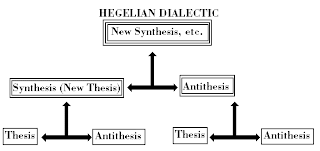In some ways, "Saboteur" is as much a poem (a deeply cynical, dark poem) as a story. The words resonate:
Mr. Chew (oh I know it's Mr. Chiu but it's also Mr. Chew)
to me, the strength of the story/ poem is that it makes of Mao's (and Hegel's and Marx's) theory of dialectical materialism a material counterpart, in fact, a food counterpart
Mr. Chiu
you're a saboteur . . . disrupting public order
rotten melon
few flies
sallow face
use your tongue
bulgy eyes, egg of a tortoise
something stirred in Mr. Chiu's stomach, a pain rising to his rib
millet porridge, a corn bun, and a piece of pickled turnip
heart disease and hepatitis
his flesh .. . must have tasted nonhuman to fleas
liver was swelling up
nausea
bowl of corn glue . . . salted celery
eight hundred people contacted acute hepatitis
Mr. Chew
And worst of all: Party had been propagating the idea that all citizens were equal before the law
Friday, November 12, 2010
Wednesday, November 3, 2010
Dialectical Materialism
Socrates' dialogues: First recorded dialectics.
Hegel is known by historians as the person who theorized a dialectical view of history.
Marx turned Hegel's ideas upside down and proposed dialectical materialism.
Thesis -- Antithesis -- Synthesis (which becomes the new Thesis)
The following is quoted from "Dialectics" in Wikipedia:
Hegel is known by historians as the person who theorized a dialectical view of history.
Marx turned Hegel's ideas upside down and proposed dialectical materialism.
Thesis -- Antithesis -- Synthesis (which becomes the new Thesis)
The following is quoted from "Dialectics" in Wikipedia:
Karl Marx and Friedrich Engels believed Hegel was "standing on his head," and endeavoured to put him back on his feet, ridding Hegel's logic of its orientation towards philosophical idealism, and conceiving what is now known as materialist or Marxist dialectics. This is what Marx had to say about the difference between Hegel's dialectics and his own:Iran, as Satrapi explains it, goes from thesis to antithesis every few years. Her own passions similarly go from God to revolutionary fervor, from passion for the government to passion against the government, and so on. This picture shows herself and her world:
My dialectic method is not only different from the Hegelian, but is its direct opposite. To Hegel, the life-process of the human brain, i.e. the process of thinking, which, under the name of 'the Idea,' he even transforms into an independent subject, is the demiurgos of the real world, and the real world is only the external, phenomenal form of 'the Idea.' With me, on the contrary, the ideal is nothing else than the material world reflected by the human mind, and translated into forms of thought." (Capital, Volume 1, Moscow, 1970, p. 29).
Ironically, dialectical materialism is the structural and theoretical underpinning of both Persepolis and "Saboteur."
Monday, November 1, 2010
Sharon and Khim's Presentation
You can watch a trailer in English
Today (Monday) Sharon and Khim showed parts of the film of Persepolis, which came out in French and which covers both the book we are reading plus Persepolis II.
Here are some of the questions I am going to ask on Wednesday:
Why are we reading this book?
What does Marjane SAY is her reason for writing the book?
What does dialectical materialism have to do with her writing of the book?
What is dialectical materialism?
How would you characterize the politics of her parents?
What do you think is the cause of the way her parents think?
What most surprised you about Persepolis?
Do you think that this book is reverent about Islam?
Do you think that a Muslim would like or dislike this book?
In what way is the writing of the book like the work of a prophet?
What is the effect on the family of their connection to royalty?
Subscribe to:
Comments (Atom)





